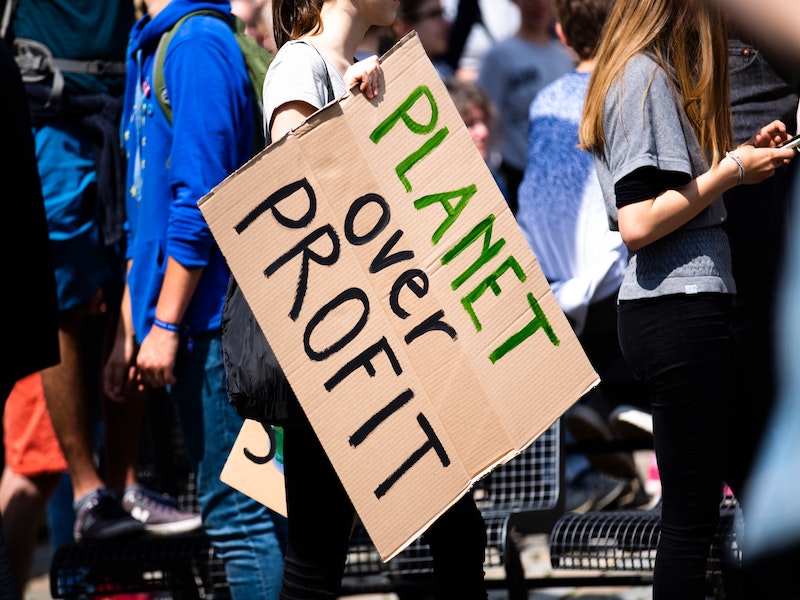Corporations have historically been legally obligated to maximise shareholder value. The environmental or social costs of maximising profits for the benefit of shareholders have been seen as externalities left for society and governments to deal with. This attitude has led to devastating environmental and social impacts. A UN report from 2010 estimated the world’s 3000 biggest companies would lose one-third of profits if environmental damage were accounted for. B Corporations are different.
Companies certified as B Corps are purpose-driven and create value for all stakeholders, not just shareholders. They seek to harness the power of business as a force for good to create a sustainable economy.
At face value, they sound great, a welcome departure from the traditional corporation. But while being far better than the traditional corporation, the B Corp won’t be part of a sustainable future economy. Here are six reasons why.
1. Still champion a growth economy
On its About B Corps page, B Lab (the non-profit company that certifies companies as B Corps) makes a bold claim;
By harnessing the power of business, B Corps use profits and growth as a means to a greater end: positive impact for their employees, communities, and the environment.
One word stands out amongst the impressive rhetoric; growth.
And B Lab’s championing of the power of economic growth as a force for good is flawed for various reasons.
Firstly, as the economist Kenneth Boulding once said, “anyone who believes that exponential growth can go on forever in a finite world is either a madman or an economist”. The idea economic growth can be part of a sustainable future is a contradiction when growth on a finite planet is, by definition, unsustainable.
What makes economic growth so unsustainable (aside from it being impossible to sustain indefinitely) is that for an economy to grow continuously, it requires an ever-increasing production of goods. This leads to an increasing reliance on the natural world, as we need to take more from the natural world to create the products and services that are then sold within the economy.
This is bad for the environment as it requires massive energy inputs. It’s also bad for society as it creates a culture of consumption, the pursuit of which has a toxic social influence. Not to mention the fact consumption increases individual carbon footprints that undermine progress towards net carbon zero.
It is undeniable that economic growth has led to incredible social progress in many countries around the world. That growth has translated into increasing incomes that has led to increased wellbeing for individuals. But what makes the pursuit of economic growth even more questionable is that many developed nations have reached a point where more growth does not translate into increased social wellbeing.
The only thing the pursuit of growth will do is make the environmental challenges we face worse. So it is questionable that B Corp believes growth can be harnessed to create a sustainable economy.
2. Profit is still the priority
B Corp has to believe in the power of growth because they exist within an economy where growth is the underlying goal. They also have to operate in the same markets as large corporations and other companies whose bottom line is profit.
In an environment where profit is king, the idea a B Corp can do things differently, where the triple bottom line of people, planet, profit is prioritised, sounds too good to be true. To remain competitive, strategic decision-making has to centre on revenue, cash flow and balance sheets.
While many B Corps are purpose-driven and have an environmental or social mission baked into their business model, the reality for B Corps is that in highly competitive markets, they must prioritise profit over anything else. If they don’t, when competing against companies that do, they will soon find themselves uncompetitive and out of business.
If becoming a certified B Corp leads a business to go bust, it kind of defeats the point of becoming one in the first place.
The B Corp agenda is not to transform or redesign the economy; they want to adapt and tinker with capitalism. The underlying belief is that the free market can play a key role in solving the environmental and social challenges humanity faces.
The idea that B Corps use profits and growth as a means to a greater end feels like greenwashing because those very features of the current economy make it unsustainable.
3. It’s a powerful label
In a world where people are becoming far more eco-conscious, eco-labels are a powerful way to distinguish between a good company spearheading social and environmental change and a company that doesn’t see it as a priority. labels show people that this company cares.
Companies are forming a queue to join the B Corp ‘revolution’ because they know that doing so will do wonders for their brand and entice new customers. This will help them sell more of their product and increase profits.
If the label acts more as a USP than a tangible movement for change, then it feels more like greenwashing than actually driving changes to free-market capitalism that will lead to a transformation of the economy.
The bottom line is that these companies still operate in a free market capitalist system. The very same system that has created catastrophic environmental damage that could lead to social collapse. And so, they are still driven by and compelled to act within a system that is undermining itself.
4. A flawed certification process
Then there is the certification process. Becoming a certified B Corp is a rigorous process. B Lab boasts how;
“B Corp Certification is the only certification that measures a company’s entire social and environmental performance.”
Companies need to complete the B Impact Assessment to become certified. The assessment measures the company in three impact areas; Workers, Community, and Environment.
To qualify as a B Corp, a company needs to score 80 out of 200 on the assessment.
But, once you have passed the assessment and gained B Corp status, there is no incentive to do anything to progress against targets.
There is no distinguishing factor between a B Corp that scores 160 out of 200 or one that just passes with a score of 82. A B-Corp is a B-Corp. It’s not like you’re an ‘okay’ B-Corp, a ‘good’ B-corp, a ‘great’ B-Corp. In the eyes of consumers, which is the most important part of all this, you’re a B Corp. Very few people are going to check what a company scored in the assessment.
By gaining the certification, you have that sought after USP that can help you entice eco-conscious consumers.
Some companies do get a high score, and B Corp has celebrated these companies on their Best for the world page. Only, the last time they did so was in 2015. So it doesn’t seem to be too much of a priority to reward the best companies that are a driving force in their attempts to create increased social or environmental value.
5. B Corp offer no vision of what a sustainable society looks like
While B Corp says they are “accelerating a global culture shift to redefine success in business and build a more inclusive and sustainable economy”, they fail to mention what a sustainable economy looks like.
A fundamental flaw with the B Corp movement is that B Lab doesn’t have a vision of success for companies to aim for.
And so, on top of there being no incentive to improve a score, it’s not entirely clear if attaining a perfect score of 200 would make a company sustainable. You suspect not if that company would continue to exist in a world where economic growth is the foundation of the economy.
If there is no guarantee that a company scoring 200 would be sustainable, it’s all the more reason for companies not to invest too much time or energy into improving their score.
6. B Lab depends on companies paying annual fees
While B Lab is a non-profit company, it does need revenue to sustain itself. B Lab’s business model is based on certified B Corps paying an annual fee.
The amount a company pays for certification depends on annual sales. The fee ranges from $1000 for a company with sales under $150,000, all the way up to $50,000 for a company whose annual sales exceed $750 million.
You suspect because B Corp has become such a well-known eco-label, the price is well worth the benefits it creates to a brand in providing a great marketing tool to create that USP.
Forgive the cynicism, but if B Lab relies on annual fees, then once a company joins the club, it may find it easier to be less prudent in its auditing process. After all, if the audit is too harsh and a company loses its certification, B Lab loses the annual fee. While it is not profit-seeking, it does have costs like any other business, and so ultimately, it is driven by balance sheets.
The movement can only exist if companies continue paying the annual fee and buying into the upside it creates for themselves. And so B Lab must also be attractive to the companies that pay for certification. It inevitably will create conflicts of interest, where what is beneficial for B Lab may not be so great for the mission they are pursuing.
It provides an illusion that radical change is happening
Gaining B Corp status has become a valuable USP, but outside of that, B Corps won’t radically change capitalism; they don’t even seek to.
When the economic system B Corps operate in is governed by a set of belief systems that undermine the environment, B Corps only works to provide an illusion of change.
B Corps highlights one of the fundamental problems in transitioning to a sustainable society. Because we all exist in this social construct, the options available to us in terms of solutions to the current problem are constricted by what is possible within it.
It would be no good for B Lab to claim growth and profit aren’t part of a sustainable future. If they did, no company would have joined the movement in the first place. So B Lab has little option but to play by the rules that are making the problem worse.
The uncomfortable reality is that for anything to change, everything must change.
What makes the challenge we face so stark is that powerful companies and the wealthy elite gain their influence and power from things remaining as they are. So they have no incentive to trigger a transformative social and economic change when they would be the ones that would lose out from those changes.
While lots of companies are well-meaning we continue hurtling down a path of making the environmental crisis a whole load worse.
To create a sustainable economy and society that work in harmony with the natural world, adaptation simply won’t do. It’s either wholesale transformative change or an illusion of change. B Lab supports the illusion, an illusion that is accelerating society towards a brick wall that could lead to social collapse.



